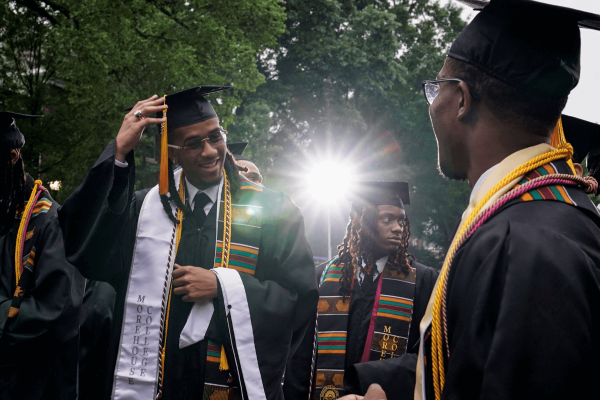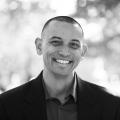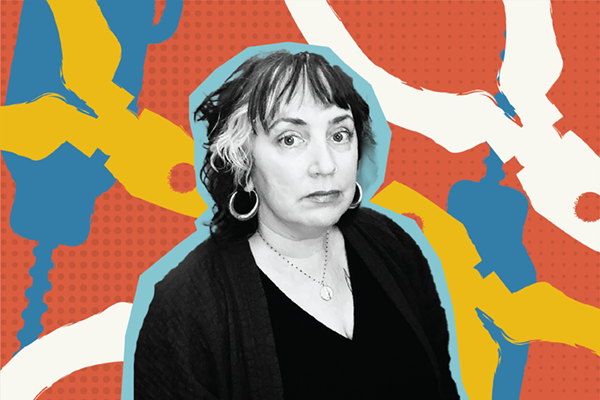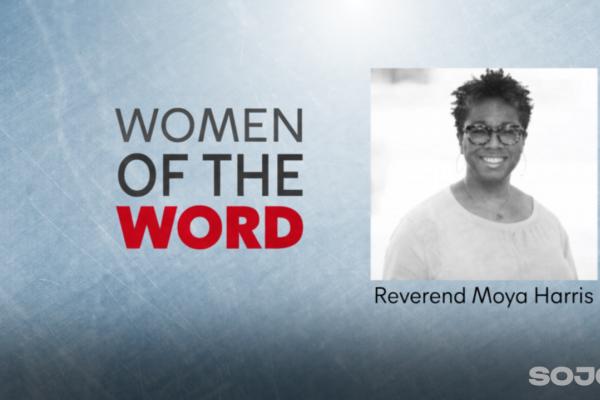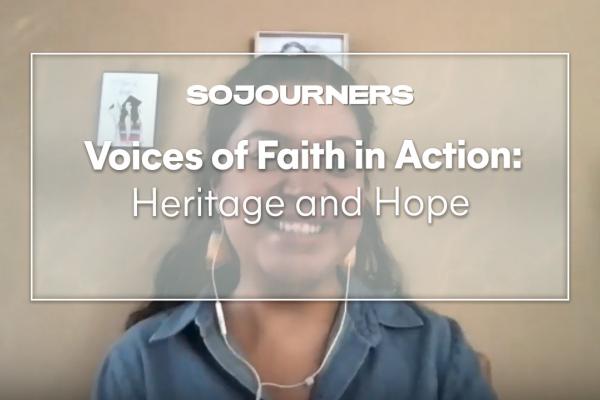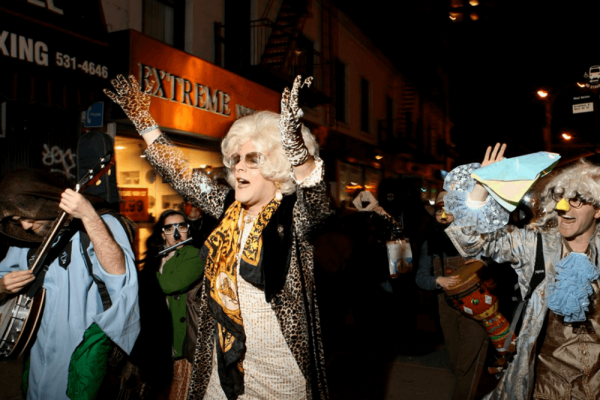College commencement address season regularly delivers controversy alongside the clichés and this year was no exception, with students staging pro-Palestinian demonstrations and Kansas City Chiefs' kicker Harrison Butker’s patriarchal, anti-LGBTQ, and antisemitic address at Benedictine College. As many have noted, many of this year’s college graduates had their 2020 high school graduation ceremonies canceled because of COVID-19.
As a faith leader, I wanted to offer my own reflections to this group of young people who have already faced tremendous challenges in life and yet who have demonstrated their resilience and fierce passion for justice. If you are a graduate or have a close family or friend that is graduating, this message is particularly for you, along with my heartfelt congratulations; I hope it offers some hope and spiritual sustenance in a time of such deep uncertainty.
For the Class of 2024
Take a deep breath and look around: You made it.
As you exhale, I want to tell you about a song that came out while most of you were just barely out of kindergarten. The song, called “Overcomer,” was by Mandisa, an American Idol finalist and gospel artist whose friend was struggling through breast cancer. “You’re an overcomer,” soars the song’s chorus, “Stay in the fight ‘til the final round / You’re not going under / ‘Cause God is holding you right now.”
I share this with you, Class of 2024, because you are overcomers. Your educational lives were upended by the pandemic, yet you demonstrated your resilience, overcoming the challenges of online learning and social distancing to reach this milestone. You dealt with stress, anxiety, isolation, and other mental health challenges in ways no previous generation has faced. Yes, you are already overcomers.
And yet, I also share this song because there’s an important footnote to its history, one that makes the song even more poignant: Though the song — part of a Grammy-winning album — was written to express the singer’s hope that her friend would “overcome” breast cancer, that friend never recovered and eventually died. For Mandisa, the song also became about her own journey through the grief and spiritual doubt she grappled with after her friend’s death. And more recently, it’s been a song many of Mandisa’s fans have turned to following their own grief after Mandisa’s own tragic and unexpected death. In short, it’s a song about overcoming that has had to wrestle with some cold hard facts of life’s uncertainty. Much like you.
Class of 2024, you are indeed overcomers, but you’re also no strangers to grief, doubt, and other emotions we don’t often acknowledge in commencement addresses. As you accept your well-deserved diploma, I don’t need to tell you that you’re graduating in an unsettling time: uncertainty around the most consequential election of your (and my) lifetime, uncertainty around the future of our planet amid an accelerating climate crisis, and uncertainty as to the outcome of horrific and intractable wars in Gaza, Ukraine, Sudan, and so many other places. You may be uncertain about your job prospects, whether Social Security will remain solvent by the time of your retirement, or whether you will ever be able to afford a home in this overheated housing market. If you’re a Christian, you may feel uncertain about how you can stay in a faith that has so often been distorted from the gospel.
Maybe you’re hoping I’ll offer some words that would keep those feelings of uncertainty at bay, if only for a little while. But I’ve got bad news: Life is just going to keep throwing uncertainty at you.
I say this as a Christian, who trusts deeply that nothing “will be able to separate us from the love of God” (Romans 8:39) and believes God was telling the truth when God promised “never will I leave you nor forsake you” (Hebrews 13:5) and to “make all things new” (Revelation 21:5). Yet I also know that even with those promises in hand, uncertainty can still be unsettling, anxiety-causing, and despair-inducing.
The best response, I believe, is neither to ignore the uncertainty we face nor allow ourselves to be consumed by it. Instead, we can acknowledge the uncertainty while anchoring ourselves in the personal, communal, and spiritual resources that give us resilience to overcome.
As you commence into this next season of life and career, I want to share three practices that have helped me feel anchored in an ever-changing world — and which I hope will also sustain you.
1. Get to know yourself more deeply
We often advise young people, especially graduates, “to find what you are passionate about, and it won’t feel like work.” And while there’s a kernel of truth in the cliché, I think better advice is: Get to know yourself. I have found incredible guidance in the work of Howard Thurman, a spiritual mentor to Rev. Martin Luther King Jr. and author of Jesus and the Disinherited. In his 1980 baccalaureate address to Spelman College, Thurman said:
“There is in you something that waits and listens for the sound of the genuine in yourself. Nobody like you has ever been born […] and no one like you will ever be born again — you are the only one […] You are the only you that has ever lived; your idiom is the only idiom of its kind in all the existences, and if you cannot hear the sound of the genuine in you, you will all of your life spend your days on the ends of strings that somebody else pulls […] Cultivate the discipline of listening to the sound of the genuine in yourself.”
For me, this discipline of “listening to the sound of the genuine” in myself has involved the weekly routine of running, where I shut out all of the noise and listen to my own heartbeat as I also commune with God. It doesn’t have to be running; for you it may be a pastime or some other ritual — what matters most is that you prioritize time to listen.
You have likely been the recipient of plenty of advice in this graduation season, both solicited and unsolicited. Seeking counsel from others is important, but equally if not more important is to be able to recognize what brings you alive. This voice will help you discern the deeper purpose, that shapes your sense of vocation. It has taken a lot introspection and self-actualization to get there, but inspired by Bill George’s book Discover Your True North, I’ve fashioned a purpose statement that serves as a compass for my life, which is to run a relay race that spreads ubuntu, an African philosophy summed up as “I am because we are,” and builds the beloved community. I encourage you to develop over time your own pithy and memorable statement that captures the essence of your own sense of deeper purpose.
2. Make time to rest
As Audre Lorde famously wrote, “Caring for myself is not self-indulgence, it is self-preservation, and that is an act of political warfare.” My advice to you? Remember to rest well. This is advice that I wish I had taken to heart so much earlier in my own life and career. One of the books that made the biggest impact in my early career was Rest in the Storm by pastor Kirk Byron Jones. In it, Jones addresses the danger of overload, often tied to the false belief we are either indispensable or invincible. Jones reminds us that even Jesus took a nap in boat amid the storm while his disciples were panicking (Matthew 8:23-27) and encourages readers to find their own space “in the back of the boat,” which he defines as that “place where we may feel God’s full acceptance and bask in the glorious joy that is life apart from our stiving and straining.”
Rest is not just an act; it’s a commitment to caring for yourself so you can better realize your aspirations and care for others. Rest can take on many forms — though I can certainly attest that sleep is never overrated. It can also mean a silent retreat, regular meditation, deep breathing exercises, and other practices.
3. Imagine a different world … and help build it
Following my own college graduation, I became convinced that how my generation responded to the HIV/AIDS crisis would define my generation. I started an organization called Global Justice to mobilize students to respond to the devastating global crisis, particularly in sub-Saharan Africa. At the time, the crisis felt impossible to overcome: Millions of lives were at stake and the cost of life-prolonging treatment was largely beyond reach for most people who needed it. But through tireless activism, a movement led by people living with HIV, students, faith leaders, and others successfully built enough awareness and political will to inspire bold bipartisan leadership, including through passage of the President’s Emergency Plan for AIDS Relief. More than 20 years later, the initiative has saved 25 million lives and played a key role in some nations’ response to COVID.
You have many issues that may define your generation: the growing climate crisis; forging a lasting peace not just in Gaza but in the entire Middle East; the often-hidden crises of loneliness, depression, and suicide; the crisis facing our fragile democracy. Naming these crises can feel overwhelming or even push us to the point of resignation and paralysis. But from my experience, there are always “smooth stones” in our midst.
The idea of smooth stones is a metaphor I and others borrow from the biblical story of David and Goliath (1 Samuel 17), in which David — a shepherd boy — agrees to face the mighty Philistine Goliath in battle. King Saul offers David a sword and armor, but they’re so heavy David removes them. Instead, David uses his sling and finds five smooth stones from a nearby brook. With one stone, David defeats Goliath in battle, knocking him down.
Like David, we often have more of an advantage over what we face than we realize: Instead of using conventional weapons, David reimagines the battlefield according to the unique gifts that God has given him. We can draw on that same kind of sanctified imagination to see beyond our broken reality of what is and see the possibility of what could be. Resist the many forces that seek to stifle and suffocate your imagination, from the never-ending stream of merchandise (and disinformation) served up by algorithms to your own inner feelings of self-doubt, shame, or powerlessness.
More than 25 years ago, at my own graduation ceremony at Emory University, the Dalai Lama offered a commencement address — something that still feels a little surreal. I can still picture his contagious smile and diminutive but powerful stature on the stage. When I went forward to receive an award, the Dalai Lama stood up and bowed directly in front of me. I was both startled and profoundly humbled.
The Dalai Lama shared with us that our degrees alone would not make us successful or even happy. “Education is, I believe, like an instrument,” he said. “Whether that instrument is utilized properly or constructively, or differently, depends on the user.” He continued, noting that, “on the other hand, [being] a good person means [having] a good heart, a sense of caring for others and a sense of commitment, a sense of responsibility,” he said. “If you combine these two” —education and good heart — “your whole life will be constructive and happy, and certainly you can make immense benefits for society.”
Borrowing from the name of the organization that I lead, I invite you to sojourn, viewing your life and career as a spiritual pilgrimage that continually changes both you and the rest of us. Your passion for humanity, for justice, and for the future of this planet are all desperately needed in this world, right now. Your voice matters and can challenge and transform even the most intractable systems and attitudes. Our communities, our nation, and our world all need you to be bold; we need you to shine brightly and continue to be an overcomer. And as you overcome, combine your education with a good heart so you can build the kind of beloved community in which you and others can truly thrive.
Got something to say about what you're reading? We value your feedback!
